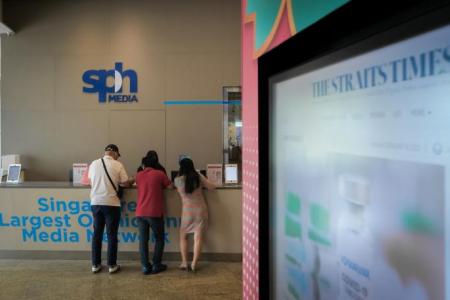SPH Media Trust to get up to $180m a year in government funding for next five years
SPH Media Trust (SMT) will get government funding of up to $180 million annually over the next five years, and the company will be required to provide half-yearly progress updates, Minister for Communications and Information Josephine Teo told Parliament on Tuesday (Feb 15).
The ministry has set aside this funding support to provide SMT with more capital to invest in the future while ensuring it is able to sustain current operations during this critical transition period, she added. The funding quantum will also be reviewed after the first five years based on the progress that SMT has made.
SPH Media Trust had spun off from mainboard-listed company Singapore Press Holdings (SPH) to become a not-for-profit entity last December, and shared its plans with the public last month.
Mrs Teo was responding to several questions from MPs such as Ms Tin Pei Ling (MacPherson) and Ms Hany Soh (Marsiling-Yew Tee GRC) on how to ensure funding support for the SMT goes towards digital transformation, as well as from Mr Alex Yam (Marsiling-Yew Tee GRC) on editorial independence and Mr Sharael Taha (Pasir Ris-Punggol GRC) on the viability of vernacular media, among others.
The minister noted that government funding of news media is common in many countries, and has increased in some cases during Covid-19, citing the examples of France, Norway and Sweden.
Mrs Teo said in the initial years, the ministry expects SMT to spend approximately 40 per cent of the funding on technology investments and digital talent.
The remainder will be spent on newsroom capability building and training, in particular the vernacular newsrooms, she said.
With such a significant amount of public funding, the Ministry of Communications and Information (MCI) will monitor SMT's performance closely through key performance indicators, she added.
These will track total reach and engagement of SMT's products, with a focus on their digital platforms; specific reach indicators for vernacular groups and youths; and resilience of SMT's flagship products to minimise downtime and disruption.
Said Mrs Teo: "SMT is required to provide progress updates to MCI on a half-yearly basis. This allows MCI to track SMT's progress, and for the Government to help SMT achieve its desired outcomes when necessary."
Mrs Teo noted that as an open, cosmopolitan city-state, Singaporeans consume varied perspectives from around the world, but "preserving local news media remains critical".
"Our local news media provide a vital Singaporean lens through which citizens can make sense of global events. It is an essential public good in our multiracial, multi-religious society," she said.
To achieve its mission, SMT must do three things, she added.
It must make long-term investments in the capability development of technology and talent; sustain and develop the vernacular news media; and position itself as a regional thought leader, she said.
Mrs Teo noted that based on a survey done by her ministry, around 65 per cent of respondents access SMT's digital content frequently in 2020, a steep jump from about 40 per cent a year before. In contrast, hardcopy reach declined from about 40 per cent to 30 per cent over the same period.
The digital pivot of SMT will be key to growing its reach, and this includes packaging complex information in a variety of ways including videos, podcasts and interactive infographics, as well as having sufficiently robust infrastructure at the backend.
The new SPH Media Academy will also update newsrooms' training programmes for the digital age.
Addressing questions from Mr Sharael asked about the viability, relevance and growing the reach of vernacular media, Mrs Teo said although vernacular readership is smaller and thus more challenging to independently sustain, it is critical to provide credible news products that serve Singapore's multi-racial society.
She said: "If we had allowed our vernacular media to wither, Singapore would have been the poorer for it. We would have lost our souls.
"Even if they were to be unviable business propositions - which they are not - we believe it is in the public interest to do all we can."
To preserve and develop all the vernacular outlets in both SMT as well as Mediacorp, the government funding for SMT will go towards sustaining vernacular newsrooms, and developing new content formats like videos and podcasts, to reach younger generations, she added.
SMT will also be partnering clan associations, community groups, and schools, to provide students with greater access to its vernacular products, she said.
To boost its thought leadership capabilities, SMT will also expand its foreign bureaus, host more events and forms, and establish more partnerships to build an international audience.
Said Mrs Teo: "As much as the media is coming under challenge throughout the world, we must be mindful that the major powers are waging a constant battle for hearts and minds worldwide - including our hearts and minds in Singapore.
"As a small country, we are especially prone to influence campaigns - overt or covert. And as a multiracial, multilingual country we are especially prone to the cultural, social and even political influence that countries like China and India can continue to exert abroad."
Hence, there is a need to have Singaporeans reporting on the world from the Singaporean perspective, she said.
"A Singaporean reporting on China, for example, would afford us a lens very different from an American or a European doing so. Thus, the growth of SMT's overseas bureaus is an important area of capability development we want to support."
Get The New Paper on your phone with the free TNP app. Download from the Apple App Store or Google Play Store now


